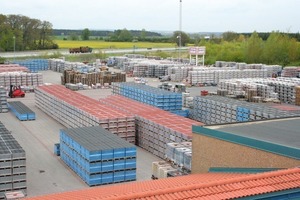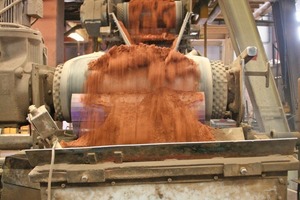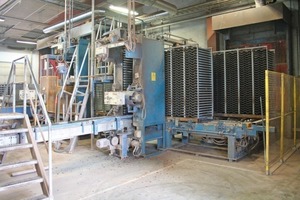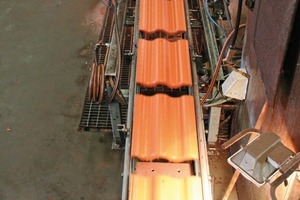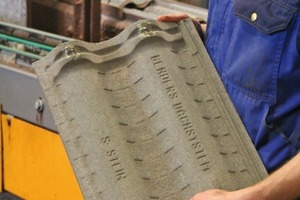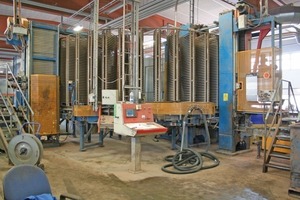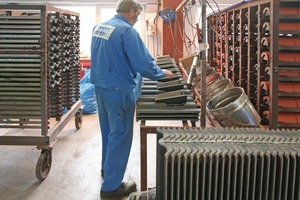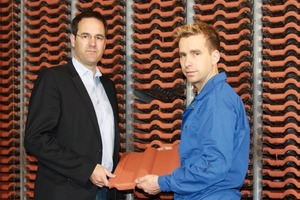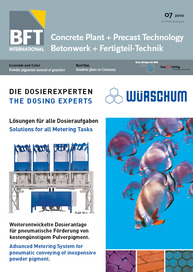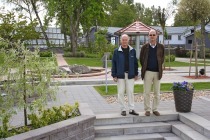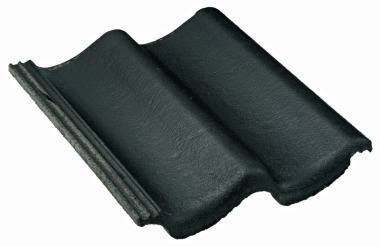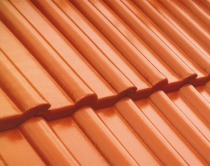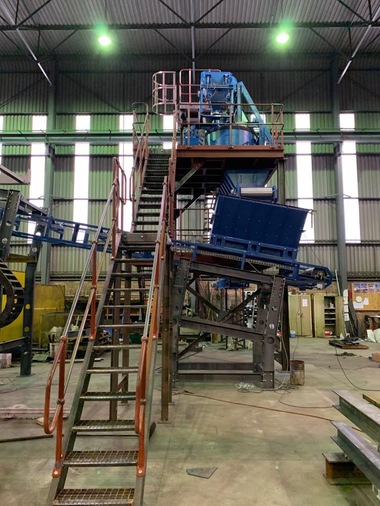The Kritzkow production site
In 2010, Benders, the roofing tile manufacturer, is celebrating its 50th anniversary. Starting out in 1960 with a small used tile machine installed in Edsvära, Sweden, the business has evolved to a large group of companies that operates plants in Scandinavia and Greece (see BFT 07/09). In 1993, Benders Dachstein GmbH was founded in Germany and started selling roofing tiles nationally. 1997 Benders decided to build a new plant in northeast Germany that started production in 1998. This site serves mainly the German but also the Latvian, Lithuanian, Czech, Slovak and Slovenian markets.
The Swedish family enterprise entered the German roofing tile market in 1993. “At that time, the area/tile price was still higher than the transport cost, and the distribution of the tiles from Bråas, in the south of Sweden, was still financially viable. Growth progressed continuously during the first few years. In 1997, Benders had already sold 7 million tiles in Germany,” says Kjell Schlichter, general manager of the Kritzkow plant. In order to meet the continuously increasing demand and to retain its good market position, the company decided to build a new plant in Germany in the same year. Benders intended to set up a distribution center in the north with a focus on the south. At that time, the overall investment amounted to approx. 20 million DM.
Benders in Germany
It was thus decided to develop a greenfield site in Kritzkow near Rostock, which offered outstanding transport links. Located in close proximity to the ferry routes to Scandinavia, the company could initially get hold of the tiles from the north (from Trelleborg, Sweden). The highway links to the west and to the south, which already existed in 1997, made it possible to expand distribution to the greater Berlin and Hamburg areas, which added to the attractiveness of the site. In addition, the German government provided grants to attract industrial enterprises to the eastern part of the country after the reunification of Germany. In the meantime, the planned highway to the east connecting to Szczecin, Poland, has also been completed. This link had been taken into account already at the planning stage of the plant and has paid off in the meantime as the tile producer has also been serving the Polish market for ten years. Just like in Germany, Benders got off to a good start in Poland. Like in the eastern part of Germany, there was a huge demand for roofing tiles in Poland. On the one hand, a large number of existing buildings had to be refurbished; on the other, the desire to build their own homes was very strong among the Polish population, which triggered the set-up, or enormous growth, of many new residential developments around the big cities.
For the Kritzkow plant, 2007/2008 was the most successful year. 2009 sales showed a slight decline compared to the good previous year. In addition, the more unfavorable exchange rate adversely affected the inclination of Polish customers to buy products, a trend that has been continuing up to now. Although a minor market recovery was felt in autumn 2009, the high level of 2008 could not be achieved again.
Approx. 20% of the site’s products are exported. As usual at Benders, the products are only distributed by field representatives and sales agencies through building and construction materials merchants and roofing specialists. External warehousing facilities are set up in Lünen near Dortmund and Strausberg near Berlin. The main sales area, however, is the north.
The company’s best-selling product is the Palema S roofing tile with its accessories, which mainly include ridge tiles, gable tiles and also halftiles, coping tiles, ventilation tiles and mansard tiles.
Production
As in all Benders plants, the tile machine, molds and packaging and transport units were supplied by Abece. As a result, spare parts can be exchanged within the entire company depending on their availability. The roof tile machine can produce up to 140 units per minute. The usual output, however, amounts to about 125 tiles per minute in order to enhance utilization and to keep the reject rate under 1%. Skako supplied a silo with four chambers for aggregates, each with a capacity of 120 tonnes, one 120 tonne silo for cement and the mixing plant. The unit serving to color the concrete was manufactured by Kimodo. The four pigment containers are big bags with a capacity of 1 tonne each.
The curing chamber that closes the work cycle is operated according to the first-in-first-out principle and was designed in-house by Benders. It provides space for 48,000 Palema S and 36,000 Mecklenburg tiles. As a result, approx. 50,000 roofing tiles are produced per each shift. In the summer months, the plant thus enables the manufacture of 100,000 tiles per day in two-shift operation.
Roofing tiles
Only four employees are required for the production of the roofing tiles. The mixing unit, the roof tile machine, the palletizing and packaging unit and the forklift used to put the tiles to outdoor storage are each operated by one employee.
Depending on the specific production plan, the machine operator orders the various colors and mix designs at the machine. In an automatic sequence, sand, oxide (pigments), cement and finally water are added. This order of addition is important since it enables the optimal management of the water content to account for varying seasonal conditions and moisture of the aggregates. The mixing unit works in a fully automatic fashion so that the unit operator can get involved in quality control activities during the shift.
Conveyors transport the colored concrete to the tile machine. A roller presses the concrete onto the well proven aluminum molds running underneath. Due to the good experience and less wear than expected Benders has started equipping other plants with aluminum molds as well. The first coating is applied to the tiles after the uniform filling of the molds. Benderit - the coating for the tiles is mixed at the Benders plant in Edsvära and send out to all plants to get the same shades of colour. This way the products coming even from different plants can be layed upon the same roof providing for an even colour at every building.
Tiles have hardened after twelve hours of storage in the curing chamber and are then coated for the second time. Prior to the second coating step, rotary separator blades lift the tile from the mold.
Then a coding machine applies a number to every single roofing tile. Prior to applying the second coating, the tiles are brushed on both sides to remove any remaining surface impureness.
At the same time, the molds are automatically brushed and oiled on both sides, and fed back into the production cycle. Many tests were carried out to optimize release agent consumption without having to compromise on product quality– with a successful outcome as the required amount of release agent could be reduced dramatically.
In order to minimize breakage during transport, a gluing machine applies two adhesive spots to each tile. These act both as a buffer and as a means to “secure the load” against slipping and spalling. In the next step, the tiles are dried for 20 minutes in the drying carousel.
Four strapping machines are used to create five-unit packages. One of these machines has been installed as a backup to prevent any production line downtime when the other machine breaks down or when strapping material needs to be fed into the system. Prior to transport to outdoor storage, groups of eight packages are strapped and put onto pallets and wrapped up in stretch film.
Ventilation tiles and halftiles
The ventilation opening is already punched into the tile during production and then beaten out manually. In the next step, the cover with ventilating grille is added and glued to the tile using a silicone adhesive. The fact that these steps are also carried out manually results in a selling price that is higher than that of standard roofing tiles.
The halftile machine produces about 1,900 tiles per day semi-automatically in one-shift operation with two to three employees. Concrete is fed into the machine directly from the mixing unit.
Quality control and product quality
Every plant has been certified to ISO 9001 and ISO 14001. Kritzkow has even obtained DINplus standard, holding all required certificates. As part of the monthly internal quality control plan, the automatic weighing system integrated in the mixing unit is checked.
Utmost care is taken to ensure that the quality control point at the end of the conveyor is permanently staffed in order to single out defective products if and when required. The reject rate amounts to about just 1%, and Benders is very proud of this result.
Specific customer requests are always responded to as the company has a strong focus on customer service. Benders strives to offer good and quick service in a spirit of partnership, avoiding any unnecessary bureaucracy. This approach is even more simplified by short internal routes of communication. “The freight forwarding company is located on site, and many of our customers greatly appreciate our strict adherence to agreed delivery dates, which we can ensure very effectively as a result,” says general manager Kjell Schlichter. This also enables deliveries to destinations that are rather unusual in the context of roofing tiles. Rather unusual long distance destinations for roof tiles such as Canada and the Arab region have been served upon request.
Outlook
Due to the high quality standard ensured at the Kritzkow plant and as a result of its favorable location, the east German plant appears to be a valuable addition to the portfolio of the Swedish company Benders, which is currently celebrating its anniversary. The team spirit already being practiced at the main plant in Edsvära, Sweden, and the delegation of responsibilities to the employees generate a creative and productive work atmosphere also at the Kritzkow plant. Suggestions to improve internal workflows and to better respond to specific customer requests are taken seriously and implemented quickly if required. One example of this approach is the gluing machine in order to maintain the quality of the product throughout delivery. Another testimony to the good people management is an average period of employment of currently ten years (while the plant has been operating for twelve years). This fact rounds off the impression that the company located near Rostock has recognized the true potential of its own workforce and is well-positioned to tackle the challenges of the future.

